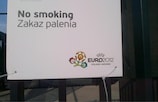UEFA/EU police training bears fruit
Thursday, November 8, 2012
Article summary
Lisbon hosted the latest phase of the UEFA and EU-sponsored Pan-European Football Police Training Programme which aims to share best practice in policing of football events.
Article top media content

Article body
Portugal successfully staged UEFA EURO 2004, and this week saw UEFA return to the capital Lisbon for another notable pan-European event.
Police officers from across Europe came together for the latest phase of the UEFA and EU-sponsored Pan-European Football Police Training Programme. All of the officers were experienced in taking charge of different aspects of major football events throughout the continent. Also present were 50 police officers from the host country, taking advantage of the opportunity to benefit from participating in a programme reflecting the contemporary best practice in policing of football events.
For the past four years, UEFA's stadium and security unit and its partners in the Pan-European Think Tank on Policing Football have driven this project forward as part of their joint working programme. The latest gathering continued the momentum of previous training sessions in the UK and the Netherlands earlier this year.
Speaking at the opening of the Lisbon event, UEFA head of stadium and security Marc Timmer reinforced UEFA's commitment to working together with European institutions and public authorities to ensure a fully integrated approach to safety and security at football matches.
"A partnership between governments, police and sports organisation is the only way forward – no single agency can succeed on its own," said Timmer. "Commitment to the delivery of training programmes such as this is a vital part of this partnership, and UEFA looks forward to continuing our joint work in this area."
Welcoming delegates to Lisbon, Dr Miguel Macedo, the Portuguese minister of home affairs, reiterated the importance of the course in equipping police officers to deal with the challenges they face in football.
"The cross-border nature of football violence and disorder is reason enough to force security organisations to get together, exchange information and experiences, and strengthen operational mechanisms in order to achieve best practices and better results," he said. "The Pan-European Football Police Training Project supported by UEFA and the European Commission is one of those initiatives where all participants clearly stand to gain."
The campaign to combat negative incidents in both domestic football and UEFA competitions was reflected at September's annual UEFA/EU Conference for National Associations, Clubs and Police in Vienna.
Events such as the one in Lisbon are a critical step in supplying the tools to police commanders to address the complex issues they must confront.
As in preceding courses, there was an important contribution from Football Supporters Europe (FSE), with Daniela Wurbs, FSE coordinator, informing delegates about the need to understand the perspective of supporters when organising safety and security operations at matches. The necessity of dialogue and effective communication with fans is now a key theme of the training programme, in recognition of the crucial part supporters play in football.
The training itself exposes participants to a taxing set of exercises that immerse them in an interactive environment related to football safety, using state-of-the-art multimedia technology. This is backed up by a wide range of lectures which combine to provide these practitioners with the practical and theoretical knowledge required to inform their decision-making in difficult situations. UEFA's guiding principles on safety and security were the foundation for the development of the training programme.
Initial feedback from students has been encouraging, with widespread agreement that the programme has a broad practical relevance to their work, and has undoubtedly improved their understanding of the challenges of international football policing. All who participated in the programme to date indicated in their feedback that they would highly recommend the training to their colleagues around the continent.








